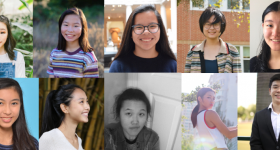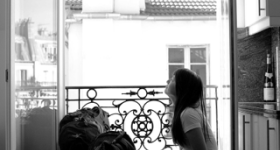Caroline Mei-Lin Mar is the great-granddaughter of a railroad laborer and the author of Special Education (Texas Review Press) and the forthcoming Dream of the Lake (Bull City Press). A high school health educator in San Francisco, she is doing her best to keep her gentrified hometown queer and creative.
Where or how did your most recent book begin?
One winter Sunday in 2015, I had to take the train home to San Francisco from Lake Tahoe because there was a big storm coming, and being a high school teacher, I could not miss Monday classes while everyone else got snowed in. Along the gorgeous, snowy route, I realized I’d never taken the train line that my ancestors had built. This collection brings together questions of colonialism, inheritance, language and love through two primary lenses: Lake Tahoe, and the building of the transcontinental railroad by Chinese labor. Through research, imagination and conversation with the Cultural Resources Advisory Council of the Washoe Tribe (the original and continued inhabitants of this land), my manuscript began to rise to the surface. In a stance oppositional to the settler-colonialist male gaze, which resulted in Tahoe’s status both as a part of the expansionist United States and a vacation destination, I felt a desperate desire to say, “I am not alone in this vast and beautiful place; you stood here, too.” I hope this book will capture the complex and multifaceted history of the lake and provide a counter-narrative to the dominant histories of the American West.
What's your best writing "food" — what do you listen to, eat, read, to get your writing juices flowing?
I've always turned to the words of others when I need to be reinvigorated in my own writing, but since 2020 my best writing "food" has been the Monday night Zoom gathering that is the BIPOC Writing Party, co-founded by Serena W. Lin and Faith Adiele. This virtual community has yielded real-life friends, new work when I thought I couldn't possibly write, tears and laughter and yelling in enthusiasm at my computer when I hear others read their work. It's a magical space that keeps me going and teaches me so much.
What is/would be your ideal setting to write?
Quiet, morning, hot tea, a good window and a stack of books I'm excited to read for inspiration during my breaks from writing. Basically a writing residency.
When/at what stage in your life did you identify as a writer/author?
When I was in the fourth grade, I wrote a persona poem from the POV of a Japanese American child being interned as part of a history assignment. A family friend (and the first real-life writer I knew) invited me to share that poem at a reading she was part of. I don't remember anything about the poem except its broad topic and that there was one line WHERE I YELLED IN ALL CAPS. At the end of the reading, they gave me a single red rose, and I was like, "This is it, sign me up!" I also still wanted to be the first woman president, but the latter dream was easier to let go of as I grew older, as opposed to the continuous pull of poetry.
Who or what in your real life inspires your writing the most?
Like so many poets before me, I tell the stories I need to hear and sing the songs of my people. I’m interested in community — as a place of solace, of conflict, of human connection. I’m a narrative poet because I love story; I’m a colloquial poet because I love voice. Maybe because I’m mixed race, maybe because I’m queer, I’m interested in the ways identity fails to define the whole, in the falsehood that a person can “be” anything. What are you? is a question mixed folks get asked constantly; my myriad answers manifest in my art. What are you, poem? For whom are you speaking?
Categories:









Comments